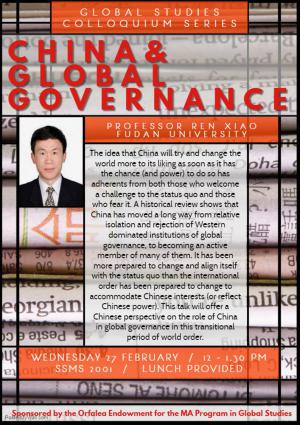Event Date:
China and Global Governance
The idea that China will try and change the world more to its liking as soon as it has the chance (and power) to do so has adherents from both those who welcome a challenge to the status quo and those who fear it. There might not be any clear understanding of what this reformed world might look like, or a clearly identified Chinese reform agenda. But the idea that we are on track to some sort of inevitable transition to a post-western era or Chinese led global governance has nevertheless garnered supporters. A historical review shows that China has actually moved a long way from relative isolation and rejection of Western dominated institutions of global governance, to becoming an active member of many of them. It has been more prepared to change and align itself with the status quo than the international order has been prepared to change to accommodate Chinese interests (or reflect Chinese power). This talk will offer a Chinese perspective on the role of China in global governance.
Ren Xiao is Professor of International Politics and Director of the Center for the Study of Chinese Foreign Policy, both at the Institute of International Studies at Fudan University in Shanghai. In partnership with China’s Ministry of Foreign Affairs, he founded the Diplomat-in-Residence Program at Fudan, the first of its kind in a Chinese institution of higher education. Professor Ren received his PhD in Political Science from Fudan and has held visiting faculty positions at universities in Finland, Japan and the US. Professor Ren has also worked as the Director of the Asia Pacific Studies Department at the Shanghai Institute for International Studies, and as First Secretary at the Chinese Embassy in Tokyo. His publications include New Frontiers in China’s Foreign Relations (co-editor, Lexington Books, 2011) and China’s Foreign Aid: Theory and Practice (2017). His research interests include international political theory, international relations of the Asia-Pacific, Northeast Asian security, and Chinese foreign policy.



